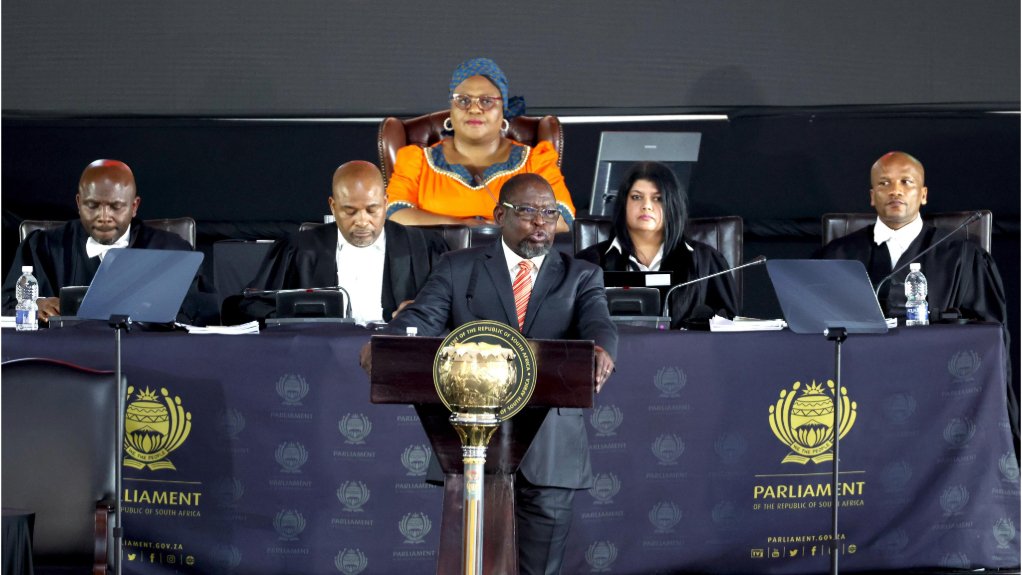Political parties expressed mixed reactions to Finance Minister Enoch Godongwana’s Medium-Term Budget Policy Statement (MTBPS) on Wednesday, with the Democratic Alliance (DA) saying this was a new chapter in South Africa's economic trajectory.
Godongwana delivered his first MTBPS since the formation of the Government of National Unity (GNU), in which he touted scaling up private-sector participation in the delivery of infrastructure for economic growth.
He also pointed out that several initiatives were underway to resolve local government failures systematically, one of which was the Eskom municipal debt relief programme.
The DA said Godongwana’s MTBPS attested to the party’s influence in guiding policy and unwavering commitment to South Africans.
The party noted and welcomed that the 2024 MTBPS contained numerous measures that it had long fought for.
“It lays the groundwork for sorely needed economic reforms, unlocking our nation's potential for job creation and sustainable economic growth. We are finally focussing on infrastructure investment instead of ever-escalating spending with little to show for it,” the DA said.
The party pointed to the need for a hard fiscal legal rule, in addition to the announced three-year fiscal anchor.
“While today's announcement marks a new chapter in South Africa's economic trajectory, we have called for these reforms for more than a decade. We have, since the 2008 financial crisis, called for limits on government debt, as well as measures to attract foreign direct investment. To the millions of South Africans that stood in queues to vote DA on May 29: this Budget is a testament to our tireless work in government and our work in opposition before that. We will continue to deliver more,” the DA stated.
RISE Mzansi national leader Songezo Zibi welcomed the MTBPS, urging Godongwana to bring to Parliament a detailed assessment of the fiscal risk posed by climate change, including disaster management financing; and increases in household and business insurance costs.
“…these will worsen the cost of living, and increase the burden on the public purse,” he said.
The MTBPS emphasised the need for accelerated investment in critical infrastructure to enable service delivery and commercial activity, he noted.
“With debt repayments of R388-billion in this financial year alone, we will need a mix of public and private capital injection or get left behind in terms of our rail, water, road and other infrastructure critical to economic growth,” he said.
He highlighted that government must bring to the fore specific plans and timelines for such investments in areas such as transport and logistics, where critical State-owned companies such as Transnet and the Passenger Rail Agency of South Africa continue to be beset by capital investment challenges.
Zibi pointed to an urgent need to reform municipalities to ensure better governance and financial management, also calling for a clear local government reform programme to enhance the quality of political oversight and administrative capacity.
FAILED POLICIES
ActionSA MP Alan Beesley said this Budget was a testament to more than a decade of “failed policy and misplaced priorities”.
Beesley pointed out that the so-called GNU was a “continuation of more than a decade of government failure.”
“The current government, under the guise of the GNU, continues to lead South Africa down a fiscally unsustainable path, ignoring the reality that we are living beyond our means and spending taxpayer money in ways that yield no meaningful returns,” he stated.
Beesley highlighted that between 2008/09 and 2023/24, government debt has ballooned from R627-billion, or 23.6% of GDP, to a staggering R5.26-trillion – 74.1% of GDP.
“Consequently, 22 cents of every rand collected by SARS now goes towards paying interest on this astronomical debt. And what do we have to show for all this debt, accumulated during a period of fiscal recklessness? Collapsing public services, virtually no economic growth to speak of, rising unemployment, and the obligation to repay this debt; a burden that will weigh down future generations for decades to come,” he said.
ActionSA also noted the 1.1% economic growth projection for the current year – an expansion of only 0.4% in the first half of the year – and an average of 1.8% over the next three years. Beesley said this fell dismally short of the 3% GDP growth rate necessary to create meaningful employment and grow South Africa’s tax base.
He explained that this “weak target” not only highlighted the inadequacies of government’s economic policy but also exposed the reality that the GNU represented nothing more than a continuation of decades of failed policies.
“Consistently falling short of its own targets, the government appears unwilling or unable to prioritise economic stability or to address the pressing issues facing South Africans,” he added.
The Economic Freedom Fighters (EFF) rejected the Budget, saying it advocated for programmes that “entrenched racialised apartheid-era economic policies, and that it prioritised profits for the "racist private sector" over job creation, sustainable development and meaningful growth.
The party pointed out that the Budget represented, what it termed "the first official joint neo-liberal economic policy of the grand coalition" led by the DA alongside the African National Congress.
It said the budget failed to acknowledge the imminent uprising of unemployed and desperate young people, and that it lacked decisive action required to prioritise job creation, infrastructure revitalisation and functional local government.
“The EFF rejects the attempt to centralise infrastructure spending in the National Treasury under the guise of budget transparency, while the true intent is to centralise patronage to a select few companies that will act as extensions of the State, operating for profit rather than service delivery.”
EMAIL THIS ARTICLE SAVE THIS ARTICLE ARTICLE ENQUIRY
To subscribe email subscriptions@creamermedia.co.za or click here
To advertise email advertising@creamermedia.co.za or click here











